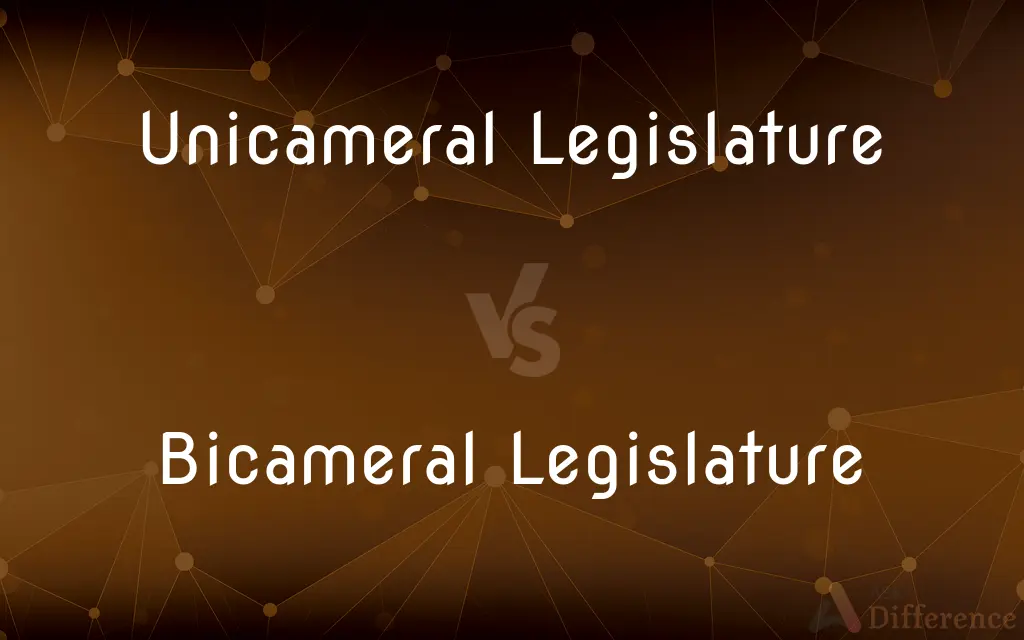Unicameral Legislature vs. Bicameral Legislature — What's the Difference?
Edited by Tayyaba Rehman — By Fiza Rafique — Published on December 26, 2023
Unicameral Legislature has one legislative chamber; Bicameral Legislature has two.

Difference Between Unicameral Legislature and Bicameral Legislature
Table of Contents
ADVERTISEMENT
Key Differences
Unicameral Legislature is a system where a single legislative chamber or house carries out the tasks of law-making. In such setups, all legislative responsibilities are concentrated in this sole body. On the contrary, a Bicameral Legislature divides these tasks between two separate chambers, often with distinct roles or methods of member selection.
In a Unicameral Legislature, the process of law-making can be more streamlined since there's only one house to pass legislation. In contrast, a Bicameral Legislature might involve more comprehensive debate and review, given the need for concurrence between two chambers before legislation can become law.
The choice of a Unicameral Legislature or a Bicameral Legislature often reflects a country's historical, political, or social preferences. For instance, smaller countries or regions might prefer unicameral systems due to simplicity and efficiency. Meanwhile, larger nations or those with federal structures might adopt a bicameral system to represent diverse interests adequately.
Unicameral Legislature systems might be criticized for lacking the checks and balances a two-house system offers. On the other hand, a Bicameral Legislature can be seen as redundant or slow, especially if both chambers have similar compositions or roles. However, the presence of two chambers in a Bicameral Legislature can act as a safeguard against hasty or ill-considered legislation.
A country's decision to adopt a Unicameral Legislature or a Bicameral Legislature is significant. It affects the pace, depth, and nature of legislative processes. While the unicameral approach offers simplicity, the bicameral system brings an additional layer of scrutiny and representation.
ADVERTISEMENT
Comparison Chart
Number of Chambers
One
Two
Efficiency
Typically faster
May be slower due to dual review
Representation
Broad, general representation
Can cater to diverse interests
Checks & Balances
Fewer inherent checks
Additional layer of scrutiny
Adoption Preference
Often in smaller nations
Common in larger or federal states
Compare with Definitions
Unicameral Legislature
A law-making body with a single chamber.
Nebraska's Unicameral Legislature ensures speedy passage of bills.
Bicameral Legislature
A complex legislative model promoting thorough debate.
Critics argue the Bicameral Legislature can slow down urgent legislative needs.
Unicameral Legislature
The simplest form of a legislative structure.
The country adopted a Unicameral Legislature for the sake of efficiency.
Bicameral Legislature
System chosen by nations seeking diverse representation.
The Bicameral Legislature ensures that both regions and populations have a voice.
Unicameral Legislature
A representative body where all members convene in one house.
Proposals in a Unicameral Legislature face fewer procedural hurdles.
Bicameral Legislature
A legislative system with two separate chambers.
The U.S. Congress is a Bicameral Legislature, consisting of the Senate and the House.
Unicameral Legislature
Legislative system without a secondary reviewing chamber.
Some argue that a Unicameral Legislature lacks necessary checks on power.
Bicameral Legislature
A double-layered assembly for comprehensive legislative scrutiny.
The Bicameral Legislature structure provides checks against potential legislative excesses.
Unicameral Legislature
A singular assembly handling all legislative tasks.
With a Unicameral Legislature, laws are processed in one centralized chamber.
Bicameral Legislature
Law-making body where bills undergo dual review.
Bills in a Bicameral Legislature must gain approval from both houses to pass.
Common Curiosities
What is a Unicameral Legislature?
A Unicameral Legislature is a single-chambered legislative system.
What are the advantages of a Bicameral Legislature?
It offers more checks and balances and can represent diverse interests.
Can either system guarantee better governance?
Governance quality depends on execution and intent, not just the system's structure.
How does a Bicameral Legislature differ from a Unicameral Legislature?
A Bicameral Legislature has two chambers, while a Unicameral Legislature has one.
How do bills pass in a Bicameral Legislature?
They usually need approval from both chambers before becoming law.
Why might a country choose a Unicameral Legislature?
For efficiency, simplicity, or based on the nation's size and structure.
Are all federal states bicameral?
Not necessarily, though many are due to diverse regional representation needs.
Does a Bicameral Legislature always have an upper and lower house?
Typically, yes, with different powers, roles, or methods of member selection.
Are Bicameral Legislatures common globally?
They are prevalent, especially in larger or federal countries.
Why would a Bicameral Legislature have similar chambers?
Historical, political, or structural reasons can lead to such a design.
Which countries have a Unicameral Legislature?
Several, including New Zealand, Norway, and Denmark.
Is one system more democratic than the other?
Both can be democratic; the key is representation and accountability.
Does a Unicameral Legislature mean quicker law-making?
Generally, yes, due to fewer procedural steps.
Can a country switch between the two systems?
Yes, through constitutional amendments or major legal reforms.
Share Your Discovery

Previous Comparison
JSP vs. HTML
Next Comparison
Hardwired Control Unit vs. Microprogrammed Control UnitAuthor Spotlight
Written by
Fiza RafiqueFiza Rafique is a skilled content writer at AskDifference.com, where she meticulously refines and enhances written pieces. Drawing from her vast editorial expertise, Fiza ensures clarity, accuracy, and precision in every article. Passionate about language, she continually seeks to elevate the quality of content for readers worldwide.
Edited by
Tayyaba RehmanTayyaba Rehman is a distinguished writer, currently serving as a primary contributor to askdifference.com. As a researcher in semantics and etymology, Tayyaba's passion for the complexity of languages and their distinctions has found a perfect home on the platform. Tayyaba delves into the intricacies of language, distinguishing between commonly confused words and phrases, thereby providing clarity for readers worldwide.













































